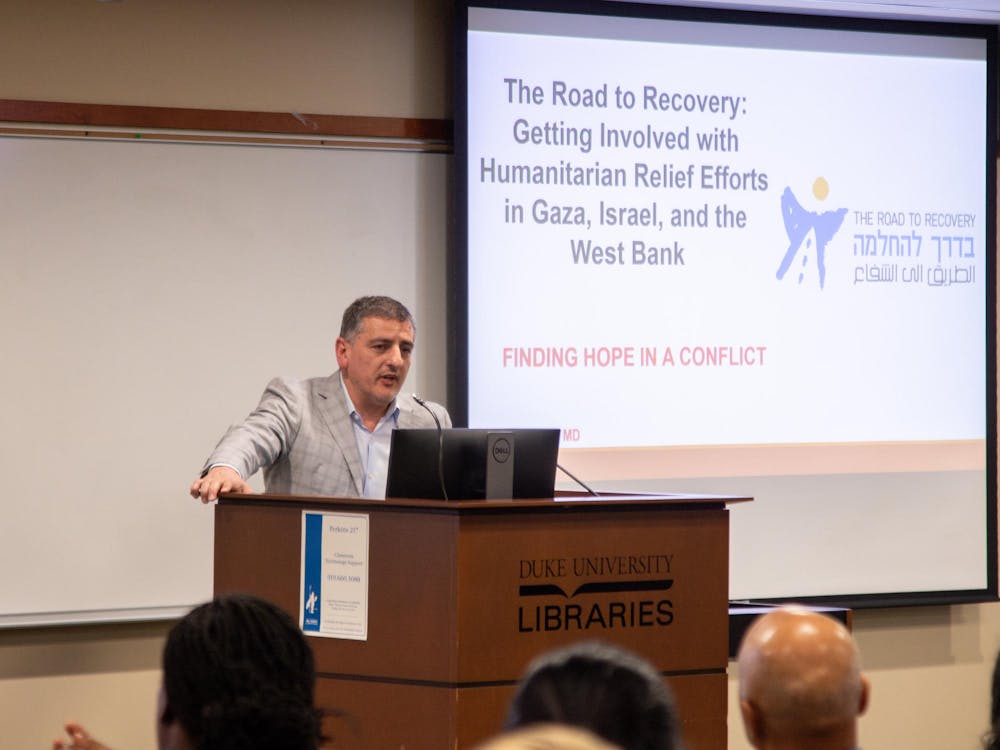Professor of Neurosurgery David Hasan spoke at a Tuesday event about his experience traveling twice to Khan Younis, a city in the southern Gaza Strip, to provide medical supplies and perform surgeries amidst the ongoing Israel-Hamas war.
The event, which took place in the Korman Assembly Room of Perkins Library, is part of the Provost’s Initiative on the Middle East.
“No one knows exactly what's going on. And unfortunately, our speculation is rising as the dialogue and negotiation count is happening,” Hasan said. “What you need to get from this is the magnitude of the problem happening in Gaza.”
As of April 11, around 33,500 Palestinians have died in Gaza, according to Palestinian health authorities. Nearly 1.7 million people remain forcibly displaced.
Hasan noted that in recognizing the humanitarian crisis, it is important to remember that there are “innocent people on both sides.” He said that he decided to “focus on Gaza because of the scale,” but also acknowledged the importance of “keep[ing] in mind what has happened in Israel” and paying attention to the 129 Israeli hostages remaining in Gaza.
“They are not going to rest until the hostages come back,” he said.
According to Hasan, humanitarian aid must be blind to identifying characteristics that could introduce bias, including “race, ethnicity, religion, gender, sexual orientation and nationality.” Instead, the focus should be on “the human being and how to help them.”
Hasan shared how meeting Palestinians in Gaza and witnessing the war firsthand allowed him to fully grasp the humanity behind the numbers.
“When you go [to Gaza], and you meet these people … you hear their names, you hear their stories, aspirations, and [you realize] they're like us,” he said.
Hasan also highlighted how he witnessed the lack of sanitation and access to food for Palestinians, remarking that “there’s only one functioning hospital … in the entire [Gaza Strip].” He added that due to a lack of medical supplies, doctors have been forced to perform amputations and cesarean sections without anesthetics, which often leads to infection and death of the patient.
When Hasan went to Gaza in January, he contracted COVID-19. During his second visit in March, he caught gastritis.
Hasan proceeded to share two separate stories from his time in Gaza. The first was about an unaccompanied child he performed surgery on who doctors expected to die. The hospital staff did not know his name or where he came from, so Hasan named him Jacob — which he said he would have named his own son if he had one — and held him until he died.
The next story Hasan shared was about three kids, who were one, six and 10 years old, whose parents were shot and killed in their home. The 10-year-old kept them safe in the house throughout the night, then went to the hospital in the morning to get help. Hasan talked about the bravery and maturity of the 10-year-old and “the struggle between a smile and a cry” that the child had when she received candy and toys from the staff at the hospital.
“This is where the catastrophe is happening,” he said. “No access to water, food and medical aid and being isolated completely by this blockade.”
Senior United Nations officials warned the UN Security Council in February of “imminent famine” in Gaza, alleging that hunger was being used as a weapon of war and advocating for immediate humanitarian aid efforts. As of April 1, 32 people — including 28 children — in Gaza have died of starvation, according to Gaza’s Health Ministry, and recent reports claim that 1.1 million people are currently experiencing “catastrophic food insecurity” in Gaza.
Hasan discussed ways that Duke researchers could help address the health, water sanitation, nutrition and education issues in Gaza. He suggested medical bubbles to keep surgeries sanitary, solar energized ventilators and online learning solutions for students.
“The challenge with [the war] is the complete loss of trust between the two groups, between the Israelis and Palestinians,” Hasan said. “And the fear, which has been for 75 years and going, is imprinted in their DNA.”
Get The Chronicle straight to your inbox
Signup for our weekly newsletter. Cancel at any time.
Aseel Ibrahim is a Trinity first-year and an associate news editor for the news department.

